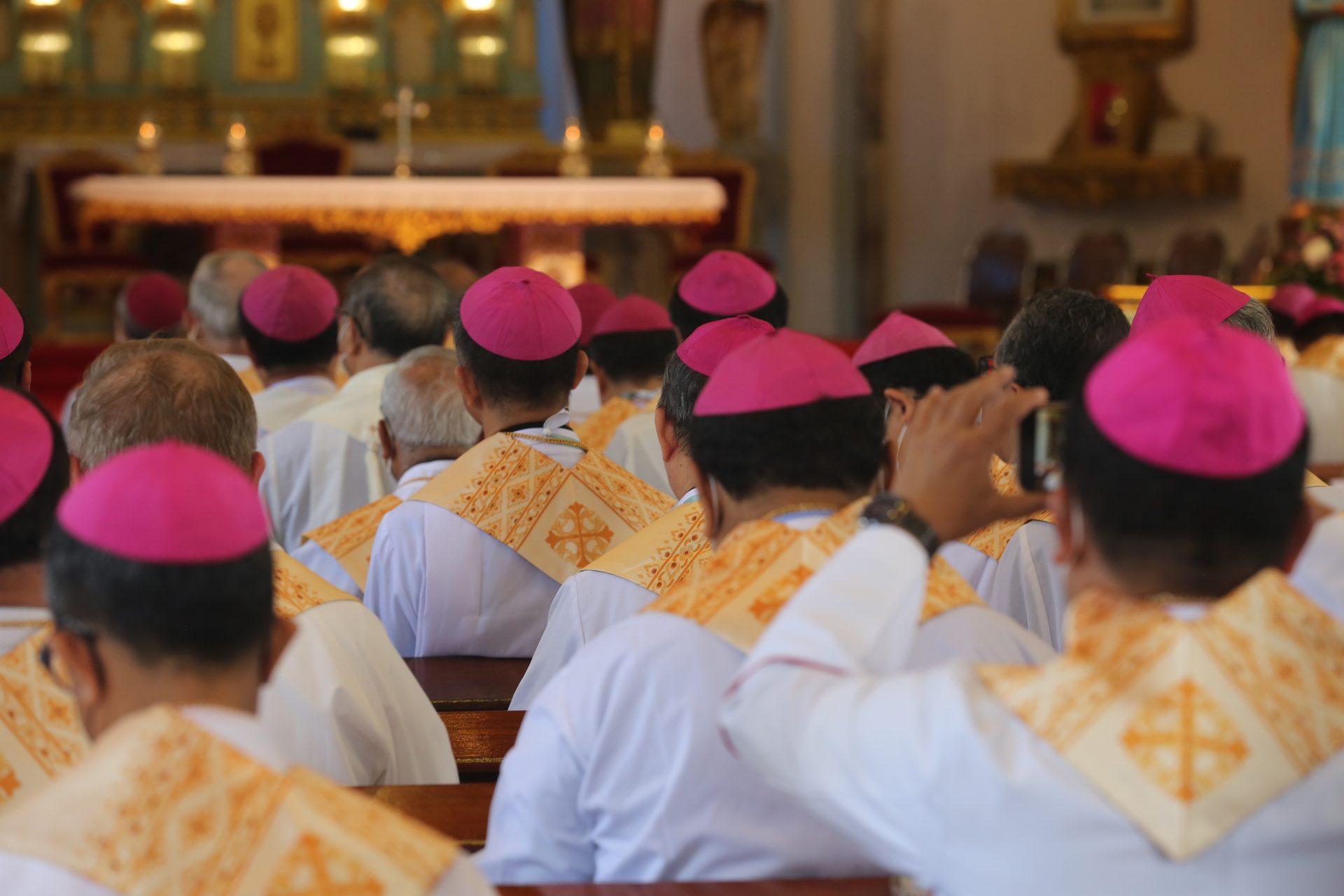We, the bishops — chairmen and secretaries of episcopal commissions for Social Communication in FABC member conferences — gathered in a hyflex onsite and online meeting from November 6 to 10, 2022, for the 27th annual FABC-OSC Bishops’ Meet.
The conference theme “Communication and the Synodal Church” explored the impact of (1) synodality and the communication ministry, and (2) the role of communication in a synodal Church.
Resource persons from the Holy See, Singapore, Sri Lanka, India, and the Philippines explored the theme from various perspectives. Representatives from the Holy See’s Dicastery for Social Communication and the Secretariat of the Synod, the Catholic Media Council (CAMECO), and Radio Veritas Asia (RVA) were also present and joined the deliberations.
Pope Francis’ call in October 2021 for synodality and a synodal Church has initiated a process of reflection at all levels of the Church on ways of living the spirit of synodos (Greek) and its equivalent concilium (Latin), which essentially beckons the pilgrim people of God to journey together on a common path.
The process continues worldwide to unfold and lay down mechanisms for the formation of a synodal Church where the faithful journey together, in communion with one another recognizing their dignity and equality in Christ through their baptism, in active participation and mission towards a common goal.
Our deliberations thus focused on the nuances of the theme of the three-year synodal process from 2021 to 2024 with its focus on “Communion, Participation, and Mission.”
In the light of the FABC’s own emphasis enunciated more than three decades ago on “A New Way of Being Church in Asia” (FABC V, Bandung, 1990), we acknowledge the fact that communication is central and fundamental element in the church and in the synodal process. Communication is viewed as something beyond the listening dimension, but as a constitutive element in the new way of being Church, her evangelizing mission and in fostering intercultural and interreligious dialogue and people’s participation.
We also reiterate that:
The Church, by her essence, is communication, reflecting the communication and communion of the Holy Trinity. “She was founded to continue the communication of Jesus Christ in word and deed” (FABC-OSC Bishops’ Meet 1996). Communication is, therefore, “the soul of the apostolate” of the Church (BISCOM III, 2001).
The New Way of Communicating Church in Asia is also marked by communion, and participation. The Church is called to bear witness through dialogue and through her prophetic mission in her communication (FABC-OSC Bishops’ Meet 1997).
However, we recognize that our efforts towards synodality calls for efforts of communicating God’s loving self-communication, fostering co-responsibility, networking, inclusivity, cooperation as well as social transformation across religions, cultures, and socio-economic statuses. These realities lead us to recognize the following:
ORIENTATIONS
1. The lack of a free and genuine communication culture is observed in some Asian societies and communities.
2. Media praxis of the Church, including the engagement with digital media, only seldom resonates the voice of the voiceless and marginalized.
3. Communication/ media education programs are found to be largely instrumentalist and inadequate in our parishes and dioceses.
4. Communication is not sufficiently recognized as an essential element of the mission of the Church. In most local churches it remains at the periphery of the Church’s evangelizing, catechetical mission and other ministries.
5. Communication is rarely understood as a constitutive dimension of what it means to be Church, and much less to be a “synodal Church.”
RECOMMENDATIONS
In light of the foregoing, we hereby recommend the following:
1. If the Church is to truly reflect the Trinitarian communion, her communication must foster, enable, and facilitate community life that is participatory as well as inclusive.
- 1.1 The Office of Social Communication (OSC) in FABC-member conferences must function as an enabler and bridge, a strategist and leader, and effectively communicate within and outside the Church.
- 1.2 The OSC must inspire other ministries and the faithful in general to “communicate in the most profound sense” (Communio et Progressio, 1971, 11), and in consonance with the vision of synodality.
- 1.3 Those entrusted with the responsibility of communication ministry in the Church must foster the spirituality of communication (FABC-OSC Bishops’ Meet 2001), and synodality.
2. If the Church is to be genuinely participatory, her communication must recognize the dignity and equality of all the baptized and strive to foster and promote co-responsibility at all levels.
- 2.1 Training and formation in communication and synodality must be offered to all the faithful, more particularly to catechists, religious educators, and pastors in general.
- 2.2 The OSC and its partners must exercise due diligence in disseminating adequate information in both understandable as well as appropriate forms.
3. If the Church is to be truly missionary, she must be imbued by the gifts of the Holy Spirit in discovering the potential of communication for its evangelizing mission.
- 3.1 Everyone in the Church must strive to create and maintain an environment that fosters “listening to one another with the ear of the heart” (Pope Francis Message for World Communication Day 2022).
- 3.2 All communication enterprises of the Church, including the FABC-owned Radio Veritas Asia (RVA) — Asia’s missionary voice, and the FABC Communication institute, Veritas Asia Institute for Social Communication (VAISCOM) must be engaged in fostering and promoting communion, participation as well as the evangelizing mission of the Church.
- 3.3 Communication must promote and strengthen the evangelizing mission of the church by responding to the needs and situations of the time. All Christian communication ministry must strive to bear witness to Christ’s communication expressed in his self-emptying and service (koinonia and diakonia).
Federation of Asian Bishops’ Conferences – Office of Social Communication (FABC-OSC)







